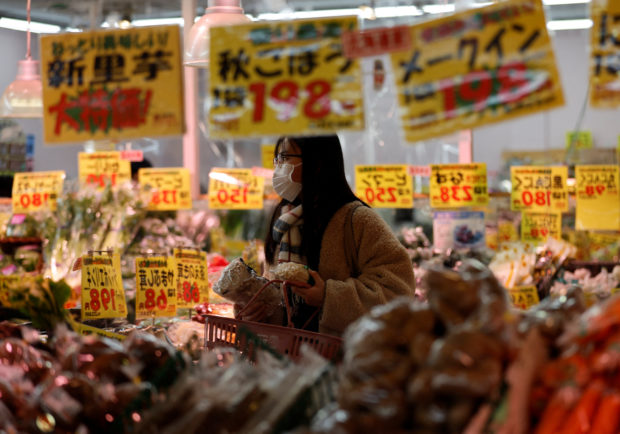Japan consumer inflation rate seen accelerating to over 41-year high, poll shows

A shopper is reflected on a mirror glass as she checks food items at a supermarket in Tokyo, Japan Jan 20, 2023. REUTERS/Issei Kato/File photo
TOKYO – Japan’s core consumer prices likely accelerated to a more than 41-year high in January, a Reuters poll of 19 economists showed, reflecting companies’ will to raise prices while squeezing household purchasing power as wages lag cost-push inflation.
Nationwide consumer prices index (CPI) data by the internal affairs ministry, to be released at 0830 JST Feb. 24 (2330 GMT Feb. 23), could dash policymakers’ hope of achieving sustainable and stable inflation along with structural wage hikes.
The core CPI is set to reach 4.2 percent in January versus the same month a year earlier, accelerating from December’s 4 percent, the poll showed.
December’s figure was double the Bank of Japan’s (BOJ) target, however the bank considers that rate as far from sustainable as it is mainly driven by the elevated cost of energy and commodities.
“Wholesale prices have likely peaked out reflecting adjustment in commodity markets and slowdown in import prices, with oil and coal products declining,” said Takeshi Minami, chief economist at Norinchukin Research Institute.
“However, the input and labour costs have not yet been fully passed on to final consumer goods and services, which will likely prod Japanese firms into raising prices this spring.”
Wholesale prices in January rose 9.5 percent from a year earlier across items as varied as food, steel and chemicals, data showed last Friday. Such a rate is likely to keep the central bank under pressure to phase out its economic stimulus programme.
The last time core consumer inflation accelerated to 4.2 percent was September 1981 in the wake of the Middle East oil crisis, a region Japan still heavily relies on for oil imports.
The central bank closely watches the core CPI – which excludes volatile fresh foods but includes oil products – as a key gauge of inflation as it aims to achieve its 2 percent price target in a sustainable and stable manner.
The latest data release falls on the day when academic Kazuo Ueda – the government nominee to succeed BOJ Governor Haruhiko Kuroda along with the two new deputies – attends closely watched confirmation hearings at the lower house of parliament to formalise the nomination.
Read Next
Subscribe to INQUIRER PLUS to get access to The Philippine Daily Inquirer & other 70+ titles, share up to 5 gadgets, listen to the news, download as early as 4am & share articles on social media. Call 896 6000.
For feedback, complaints, or inquiries, contact us.
For all the latest Business News Click Here
For the latest news and updates, follow us on Google News.



